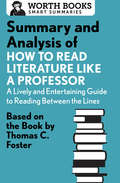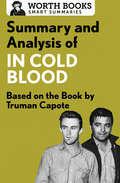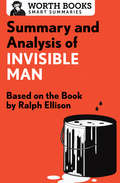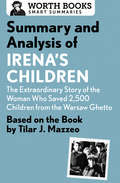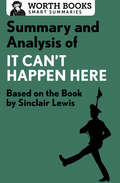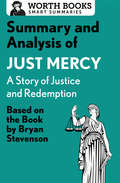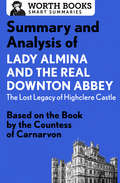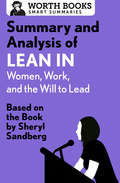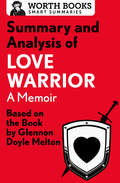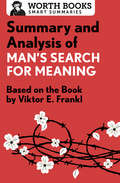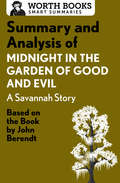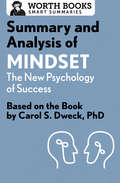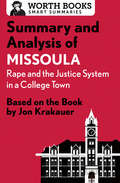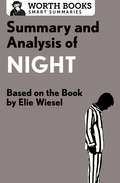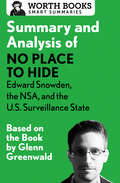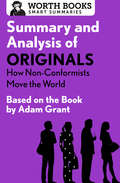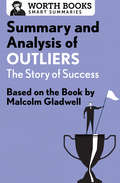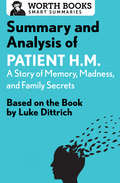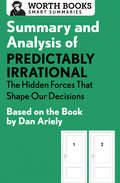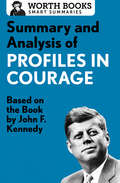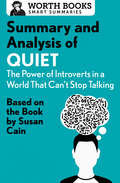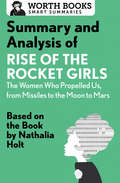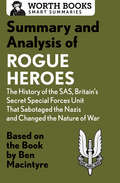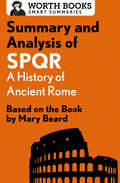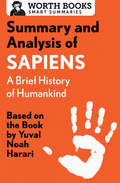- Table View
- List View
Summary and Analysis of How to Read Literature Like a Professor: Based on the Book by Thomas C. Foster (Smart Summaries)
by Worth BooksSo much to read, so little time? This brief overview of How to Read Literature Like a Professor tells you what you need to know—before or after you read Thomas C. Foster&’s book. Crafted and edited with care, Worth Books set the standard for quality and give you the tools you need to be a well-informed reader. This summary of How to Read Literature Like a Professor by Thomas C. Foster includes: Historical contextChapter-by-chapter overviewsImportant quotesFascinating triviaA glossary of termsSupporting material to enhance your understanding of the original work About How to Read Literature Like a Professor by Thomas C. Foster: Thomas C. Foster&’s How to Read Literature Like a Professor is a series of short essays that show readers how to &“read between the lines&” and make great books come alive. Based on Professor Foster&’s years as a teacher of literature, Foster explains how authors use the English language to accomplish their goals and how we can recognize literary ideas in a wide range of works. The tools he offers can be applied to any book—from the classics to the latest blockbusters. The summary and analysis in this ebook are intended to complement your reading experience and bring you closer to a great work of nonfiction.
Summary and Analysis of In Cold Blood: A True Account of a Multiple Murder and Its Consequences
by Worth BooksSo much to read, so little time? This brief overview of In Cold Blood tells you what you need to know—before or after you read Truman Capote’s book. Crafted and edited with care, Worth Books set the standard for quality and give you the tools you need to be a well-informed reader. This short summary and analysis of In Cold Blood by Truman Capote includes: Historical context, Chapter-by-chapter summaries, Detailed timeline of important events, Important quotes, Fascinating trivia, Supporting material to enhance your understanding of the original work. About Truman Capote’s In Cold Blood: A masterpiece of true crime and literary nonfiction, Truman Capote’s In Cold Blood is the story of a 1959 multiple murder in rural Kansas. Combining journalistic research with masterful storytelling, Capote reconstructs the events surrounding the killing of the Clutter family and the crime’s aftermath—from the last day of the Clutters’ lives to the day their murderers are executed. Gripping, chilling, and suspenseful, In Cold Blood is a pioneering work of nonfiction and a highly acclaimed modern American classic. The summary and analysis in this ebook are intended to complement your reading experience and bring you closer to a great work of nonfiction.
Summary and Analysis of Invisible Man
by Worth BooksSo much to read, so little time? This brief overview of Invisible Man tells you what you need to know—before or after you read Ralph Ellison’s book. Crafted and edited with care, Worth Books set the standard for quality and give you the tools you need to be a well-informed reader. This short summary and analysis of Invisible Man by Ralph Ellison includes: Historical context, Chapter-by-chapter summaries, Detailed timeline of key events in Ralph Ellison’s life, Analysis of the main characters, Themes and symbols, A note on the author’s style, Important quotes, Fascinating trivia, Glossary of terms, Supporting material to enhance your understanding of the original work. About Invisible Man by Ralph Ellison: A 20th-century classic, Invisible Man is the story of a young man’s journey to self-discovery—from growing up black in the post-war South, to being expelled from a Negro college, to moving to Harlem and joining an activist organization called the “Brotherhood,” to disappearing into the city’s underbelly and becoming truly invisible…. More than a commentary on issues of race in America, Invisible Man is an extraordinary story of identity, truth, and what it means to be human in a broken world. Winner of the National Book Award, Invisible Man is no less pertinent today than it was upon its initial publication in 1952. The summary and analysis in this ebook are intended to complement your reading experience and bring you closer to a great work of fiction.
Summary and Analysis of Irena's Children: The Extraordinary Story of the Woman Who Saved 2,500 Children from the Warsaw Ghetto
by Worth BooksSo much to read, so little time? This brief overview of Irena’s Children tells you what you need to know—before or after you read Tilar J. Mazzeo’s book. Crafted and edited with care, Worth Books set the standard for quality and give you the tools you need to be a well-informed reader. This short summary and analysis of Irena’s Children includes: Historical context, Chapter-by-chapter overviews, Profiles of the main characters, Detailed timeline of key events, Important quotes, Glossary of terms, Supporting material to enhance your understanding of the original work. About Irena’s Children: The Extraordinary Story of the Woman Who Saved 2,500 Children from the Warsaw Ghetto by Tilar J. Mazzeo: Despite great risks, Irena Sendler, known as the female Oskar Schindler, rescued approximately 2,500 Jewish children from the Warsaw Ghetto—and death. Using a secret underground network to place children in foster families and Catholic orphanages, and providing them with new identities through forged paperwork, Irena was able to smuggle the children out of the ghetto and past the Nazis. She was eventually caught and tortured, and the men and women who worked with her risked the same fate every day. Irena’s Children is the incredible story of a brave woman who would do anything to save the lives of innocent children during the world’s bleakest times. The summary and analysis in this ebook are intended to complement your reading experience and bring you closer to a great work of nonfiction.
Summary and Analysis of It Can't Happen Here: Based on the Book by Sinclair Lewis (Smart Summaries)
by Worth BooksSo much to read, so little time? This brief overview of It Can&’t Happen Here tells you what you need to know—before or after you read Sinclair Lewis&’s book. Crafted and edited with care, Worth Books set the standard for quality and give you the tools you need to be a well-informed reader. This short summary and analysis of It Can&’t Happen Here includes: Historical contextChapter-by-chapter overviewsProfiles of the main charactersDetailed timeline of key eventsThemes and symbolsImportant quotes and analysisFascinating triviaGlossary of termsSupporting material to enhance your understanding of the original work About It Can&’t Happen Here by Sinclair Lewis: Sinclair Lewis&’s satirical novel It Can&’t Happen Here documents the rise of a fascist government in the United States. It follows a small town newspaper editor, Doremus Jessup, as he watches his country come out of economic depression only to embrace a smoke-and-mirrors presidential candidate who wraps himself in patriotic zeal. This charismatic demagogue and his cronies amass power and wealth as the rest of the population watches its rights and freedoms disappear. There is censorship, the random violence of an unchecked paramilitary force, and the emergence of concentration camps. Jews, foreigners, and intellectuals are singled out for especially brutal treatment. Universities are taken over and books are burned. As he watches the devastating toll exacted from his friends and family, the once easygoing Jessup is swept into an underground resistance movement in which he must ignore his moral compass. A revolution is launched, but the outcome is uncertain. Lewis&’s dystopian work asks: could it happen here and, if it does, how would it be stopped? The summary and analysis in this ebook are intended to complement your reading experience and bring you closer to a great work of fiction.
Summary and Analysis of Just Mercy: Based on the Book by Bryan Stevenson
by Worth BooksSo much to read, so little time? This brief overview of Just Mercy: A Story of Justice and Redemption tells you what you need to know—before or after you read Bryan Stevenson book. Crafted and edited with care, Worth Books set the standard for quality and give you the tools you need to be a well-informed reader. This short summary and analysis of Just Mercy includes: Historical contextChapter-by-chapter overviewsCharacter profilesDetailed timeline of key eventsImportant quotes and analysisFascinating triviaGlossary of termsSupporting material to enhance your understanding of the original work About Just Mercy: A Story of Justice and Redemption by Bryan Stevenson: Just Mercy is a heartbreaking—but not entirely hopeless—look inside the American criminal justice system. The guide on this journey to death row, judges’ chambers, and courthouses small and large is Bryan Stevenson, one of the country’s foremost criminal justice reformers and the founder of the Equal Justice Initiative, the acclaimed legal aid organization based in Montgomery, Alabama. In Stevenson’s chronicle, the only thing standing between death or life imprisonment is an underpaid, overworked lawyer. The summary and analysis in this ebook are intended to complement your reading experience and bring you closer to a great work of nonfiction.
Summary and Analysis of Lady Almina and the Real Downton Abbey: Based on the Book by the Countess of Carnarvon
by Worth BooksSo much to read, so little time? This brief overview of Lady Almina and the Real Downton Abbey tells you what you need to know—before or after you read the Countess of Carnarvon’s book. Crafted and edited with care, Worth Books set the standard for quality and give you the tools you need to be a well-informed reader. This short summary and analysis of Lady Almina and the Real Downton Abbey: The Lost Legacy of Highclere Castle includes: Historical contextChapter-by-chapter overviewsProfiles of the main charactersDetailed timeline of key eventsImportant quotesFascinating triviaGlossary of termsSupporting material to enhance your understanding of the original work About Lady Almina and the Real Downton Abbey by the Countess of Carnarvon: Lady Almina, the 5th Countess of Carnarvon, was known for throwing fabulous parties at Highclere Castle during the Edwardian era and for turning her home into a hospital for wounded soldiers during World War I. Her biography provides a view of what it was like to live during a time of great joy and of immense sorrow, all in the place that inspired the Emmy Award–winning period drama Downton Abbey. Lady Fiona Carnarvon, the 8th Countess of Carnarvon, knows Highclere Castle—her current residence, which has been in her husband’s family since 1679—better than just about anyone. Drawing from the family’s personal archives of photographs, letters, household records, and journals, Lady Fiona give readers an inside view of the famous English country home and the remarkable woman at the center of it all. The summary and analysis in this ebook are intended to complement your reading experience and bring you closer to a great work of nonfiction.
Summary and Analysis of Lean In: Based on the Book by Sheryl Sandberg
by Worth BooksSo much to read, so little time? This brief overview of Lean In tells you what you need to know—before or after you read Sheryl Sandberg’s book. Crafted and edited with care, Worth Books set the standard for quality and give you the tools you need to be a well-informed reader. This short summary and analysis of Lean In by Sheryl Sandberg includes: Historical contextChapter-by-chapter summariesProfiles of the main charactersImportant quotesFascinating triviaGlossary of termsSupporting material to enhance your understanding of the original work About Lean In by Sheryl Sandberg: Lean In is a modern-day manifesto for women who aspire to rise to the top of their careers, as well as a pointed look at the many ways in which gender bias is reinforced in the workplace. With knowledge gleaned from Sheryl Sandberg’s experiences at Google and Facebook, and with insights from her from friends, mentors, and scientific studies, Lean In offers wisdom and inspiration to current and future leaders. With detailed steps and strategies, Sandberg shows how to lean in to our personal lives and careers—and how to help others achieve and succeed. The summary and analysis in this ebook are intended to complement your reading experience and bring you closer to a great work of nonfiction.
Summary and Analysis of Love Warrior: Based on the Book by Glennon Doyle Melton
by Worth BooksSo much to read, so little time? This brief overview of Love Warrior tells you what you need to know—before or after you read Glennon Doyle Melton’s book. Crafted and edited with care, Worth Books set the standard for quality and give you the tools you need to be a well-informed reader. This short summary and analysis of Love Warrior by Glennon Doyle Melton includes: Historical contextChapter-by-chapter summariesCharacter analysisImportant quotesFascinating triviaSupporting material to enhance your understanding of the original work About Love Warrior by Glennon Doyle Melton: Written with unflinching honesty and hard-earned wisdom, Glennon Doyle Melton’s memoir, Love Warrior, is the story of one woman’s journey from devastating heartbreak after her husband’s infidelity to a new understanding of what it means to love, to marry, and to be a woman. The summary and analysis in this ebook are intended to complement your reading experience and bring you closer to great work of nonfiction.
Summary and Analysis of Man's Search for Meaning: Based on the Book by Victor E. Frankl (Smart Summaries)
by Worth BooksSo much to read, so little time? This brief overview of Man&’s Search for Meaning tells you what you need to know—before or after you read Viktor E. Frankl&’s book. Crafted and edited with care, Worth Books set the standard for quality and give you the tools you need to be a well-informed reader. This short summary and analysis of Man&’s Search for Meaning by Viktor E. Frankl includes: Historical contextChapter-by-chapter summariesImportant quotesFascinating triviaGlossary of termsSupporting material to enhance your understanding of the original work About Man&’s Search for Meaning by Viktor E. Frankl: Written just after World War II, Viktor Frankl&’s international bestseller Man&’s Search for Meaning is both a heartbreaking memoir and a source of inspiration for millions of readers. Dr. Frankl&’s description of his time in a string of Nazi concentration camps is a fascinating, mandatory read for anyone wanting a better understanding of the Holocaust. A highly respected psychotherapist, his ideas on human emotion, the mind, mental health, tragic optimism, and the day-to-day neuroses of common people in the modern world provide spiritual guidance as each of us searches for meaning in our own lives. The summary and analysis in this ebook are intended to complement your reading experience and bring you closer to a great work of nonfiction.
Summary and Analysis of Midnight in the Garden of Good and Evil: Based on the Book by John Berendt (Smart Summaries)
by Worth BooksSo much to read, so little time? This brief overview of Midnight in the Garden of Good and Evil tells you what you need to know—before or after you read John Berendt&’s book. Crafted and edited with care, Worth Books set the standard for quality and give you the tools you need to be a well-informed reader. This short summary and analysis of Midnight in the Garden of Good and Evil: A Savannah Story includes: Historical contextChapter-by-chapter overviewsProfiles of the main charactersWhat&’s what in SavannahImportant quotesFascinating triviaGlossary of termsSupporting material to enhance your understanding of the original work About Midnight in the Garden of Good and Evil: A Savannah Story by John Berendt: John Berendt&’s engrossing bestseller Midnight in the Garden of Good and Evil tells the story of his time spent in Savannah, Georgia. Berendt didn&’t just observe the city&’s lovely locales and its quirky characters—he also became immersed in a murder case that would shock and fascinate much of Georgia. Part true crime saga, part travel diary, part reportage, Midnight in the Garden of Good and Evil is a suspenseful, sharply observed account of Berendt&’s sojourns in Savannah and the murder trial of one if its socialites. The summary and analysis in this ebook are intended to complement your reading experience and bring you closer to a great work of nonfiction.
Summary and Analysis of Mindset: Based on the Book by Carol S. Dweck, PhD (Smart Summaries)
by Worth BooksSo much to read, so little time? This brief overview of Mindset: The New Psychology of Success tells you what you need to know—before or after you read Carol Dweck&’s book. Crafted and edited with care, Worth Books set the standard for quality and give you the tools you need to be a well-informed reader. This short summary and analysis of Mindset includes: Historical contextChapter-by-chapter overviewsProfiles of the main charactersDetailed timeline of eventsImportant quotesFascinating triviaGlossary of termsSupporting material to enhance your understanding of the original workAbout Mindset: The New Psychology of Success by Carol Dweck: Why do some people flourish when faced with a challenge, while others crumble? This is the question that has defined Stanford psychology professor Carol Dweck&’s decades of research, resulting in her ground-breaking theory of mindset. Dweck believes that talent and intelligence do not tell the full story about one&’s ability to achieve. Instead, what determines personal success is whether one has a fixed or growth mindset; the first is a belief that our qualities and strengths cannot be altered, and the second way of thinking supports the idea that they can change over time. Based on meticulous research, and with anecdotes about successful CEOs, athletes, artists, and educators who achieved greatness through attitude as much as ability, Mindset offers new ways of thinking about motivation and personal development. The summary and analysis in this ebook are intended to complement your reading experience and bring you closer to a great work of nonfiction.
Summary and Analysis of Missoula: Based on the Book by Jon Krakauer
by Worth BooksSo much to read, so little time? This brief overview of Missoula tells you what you need to know—before or after you read Jon Krakauer’s book. Crafted and edited with care, Worth Books set the standard for quality and give you the tools you need to be a well-informed reader. This short summary and analysis of Missoula by Jon Krakauer includes: •Historical context •Case-by-case summaries •Profiles of the main characters •Detailed timeline of key events •Important quotes •Supporting material to enhance your understanding of the original work About Missoula by Jon Krakauer: Between 2010 and 2014, there was a spate of sexual assaults in the university town of Missoula, Montana, which drew the attention of the national media—and the Department of Justice. Centering around five cases of sexual assault at the University of Montana, Jon Krakauer’s account shows how one city became a microcosm for how campus rape is handled in the United States. Krakauer draws on police interviews, court testimony, and extensive research to reveal the complacency, failures, and successes of the prosecutors, the victims, the Missoula police, and the university in the handling of these disturbingly frequent sexual assault cases. The summary and analysis in this ebook are intended to complement your reading experience and bring you closer to a great work of nonfiction.
Summary and Analysis of Night: Based on the Book by Elie Wiesel
by Worth BooksSo much to read, so little time? This brief overview of Night tells you what you need to know—before or after you read Elie Wiesel’s book. Crafted and edited with care, Worth Books set the standard for quality and give you the tools you need to be a well-informed reader. This short summary and analysis of Night includes: Historical contextChapter-by-chapter overviewsAnalysis of the main charactersThemes and symbolsImportant quotesFascinating triviaGlossary of termsSupporting material to enhance your understanding of the original workAbout Night by Elie Wiesel: The gripping memoir by Nobel Laureate Elie Wiesel is one of the fundamental texts of Holocaust reportage and a poetic examination of a young man’s loss of faith amid unspeakable acts of inhumanity. Wiesel was 15 years old when he was sent to Auschwitz with his mother, father, and three sisters. Wiesel recalls his horrifying ordeal, including the sadistic Nazi overseers, the death of his mother and younger sister, watching fellow prisoners disappear into the crematorium, the bloody death march to Gleiwitz, and the heartbreaking fatal beating of his father only months before the camp’s liberation. Night is a poignant representation of one young Jewish man’s pain amidst the violent details of the worst genocide in world history. It is an invaluable record of the past as well as an ever-relevant warning about the consequences of fascism and bigotry. The summary and analysis in this ebook are intended to complement your reading experience and bring you closer to a great work of nonfiction.
Summary and Analysis of No Place to Hide: Based on the Book by Glenn Greenwald (Smart Summaries)
by Worth BooksSo much to read, so little time? This brief overview of No Place to Hide tells you what you need to know—before or after you read Glenn Greenwald&’s book. Crafted and edited with care, Worth Books set the standard for quality and give you the tools you need to be a well-informed reader. This short summary and analysis of No Place to Hide includes: Historical contextChapter-by-chapter overviewsCharacter profilesDetailed timeline of key eventsImportant quotes and analysisFascinating triviaGlossary of termsSupporting material to enhance your understanding of the original workAbout No Place to Hide: Edward Snowden, the NSA, and the U.S. Surveillance State by Glenn Greenwald: Journalist and constitutional lawyer Glenn Greenwald&’s No Place to Hide is a personal narrative about his communication with Edward Snowden and an extensive exploration of the true nature, size, and impact of global NSA surveillance. Greenwald&’s book is a fascinating firsthand account that explores issues of privacy in the digital age; the reach of the NSA; and its power to watch our every move, monitor trade negotiations, and coerce citizens into action. The summary and analysis in this ebook are intended to complement your reading experience and bring you closer to a great work of nonfiction.
Summary and Analysis of Originals: Based on the Book by Adam Grant
by Worth BooksSo much to read, so little time? This brief overview of Originals: How Non-Conformists Move the World tells you what you need to know—before or after you read Adam Grant’s book. Crafted and edited with care, Worth Books set the standard for quality and give you the tools you need to be a well-informed reader. This short summary and analysis of Originals includes: • Historical context • Chapter-by-chapter overviews • Profiles of the main characters • Detailed timeline of events • Important quotes and analysis • Fascinating trivia • Glossary of terms • Supporting material to enhance your understanding of the original work About Originals: How Non-Conformists Move the World by Adam Grant: Originals is an exploration into what it takes to be an original—a person whose ideas are novel, stimulating, and unconventional, and who works on improving the world and challenging the status quo. Adam Grant shows readers how to manage fear, appreciate the art of timing, recognize good ideas, and communicate new concepts in their personal and professional lives. He discusses how to inspire creativity in children and how to foster originality within organizations and teams. The summary and analysis in this ebook are intended to complement your reading experience and bring you closer to a great work of nonfiction.
Summary and Analysis of Outliers: Based on the Book by Malcolm Gladwell
by Worth BooksSo much to read, so little time? This brief overview of Outliers tells you what you need to know--before or after you read Malcolm Gladwell's book. Crafted and edited with care, Worth Books set the standard for quality and give you the tools you need to be a well-informed reader. This short summary and analysis of Outliers by Malcolm Gladwell includes: Historical contextChapter-by-chapter summariesProfiles of the main charactersImportant quotesFascinating triviaGlossary of termsSupporting material to enhance your understanding of the original work About Outliers by Malcolm Gladwell: What makes high achievers, like Mark Zuckerberg, Bill Gates, and members of the Beatles so successful? Is it pure talent? Personal drive? An off-the-charts IQ? In Outliers, bestselling author Malcolm Gladwell explores the subject of success and argues that there is more to the story than individual exceptionalism. In addition to inherent talent or intelligence, there are other factors that have come into play for the innovators, artists, athletes, and prodigies who have become household names. Many who have attained rock-star status in their fields may have education, culture, access to a specific technology or opportunity, and ten thousand hours of practice to thank for their reaching their goals. Through a wide range of examples and anecdotes, learn what makes outliers so extraordinary. The summary and analysis in this ebook are intended to complement your reading experience and bring you closer to a great work of nonfiction.
Summary and Analysis of Patient H.M.: Based on the Book by Luke Dittrich (Smart Summaries)
by Worth BooksSo much to read, so little time? This brief overview of Patient H.M. tells you what you need to know—before or after you read Luke Dittrich&’s book. Crafted and edited with care, Worth Books set the standard for quality and give you the tools you need to be a well-informed reader. This short summary and analysis of Patient H.M.: A Story of Memory, Madness, and Family Secrets includes: Historical contextChapter-by-chapter overviewsProfiles of the main charactersDetailed timeline of key eventsImportant quotesFascinating triviaGlossary of termsSupporting material to enhance your understanding of the original work About Patient H.M. by Luke Dittrich: Patient H.M. tells the extraordinary true story of Henry Molaison, a young man who underwent a lobotomy in 1953 in hopes of curing his epilepsy. Instead, he suffered extensive memory loss and would became the most studied patient in the history of neuroscience. Luke Dittrich, whose grandfather performed the surgery, artfully combines family history, medical science, and investigative journalism to create a suspenseful and unsettling narrative on the search to understand the most elusive of scientific research topics: the human memory. The summary and analysis in this ebook are intended to complement your reading experience and bring you closer to a great work of nonfiction.
Summary and Analysis of Predictably Irrational: Based on the Book by Dan Ariely
by Worth BooksSo much to read, so little time? This brief overview of Predictably Irrational tells you what you need to know—before or after you read Dan Ariely’s book. Crafted and edited with care, Worth Books set the standard for quality and give you the tools you need to be a well-informed reader. This short summary and analysis of Predictably Irrational includes: Historical contextChapter-by-chapter overviewsImportant quotesFascinating triviaGlossary of termsSupporting material to enhance your understanding of the original workAbout Predictably Irrational: The Hidden Forces That Shape Our Decisions by Dan Ariely: Predictably Irrational, the New York Times bestseller by Duke psychology and behavioral economics professor Dan Ariely, challenges the idea that we always make perfectly rational decisions. Featuring examples from daily life alongside results of his fascinating experiments, Ariely explains how emotional, psychological, and social factors can lead to irrational behavior—which can be damaging to ourselves and others. From the coffee we drink or the medicine we take, to the companies we support and the relationships we value, we make irrational decisions every day that can cost us in the long run. Ariely reveals not only when and how we tend to act irrationally, but why, so we can learn from our mistakes and design ways to facilitate smarter decision-making. The summary and analysis in this ebook are intended to complement your reading experience and bring you closer to a great work of nonfiction.
Summary and Analysis of Profiles in Courage: Based on the Book by John F. Kennedy (Smart Summaries)
by Worth BooksSo much to read, so little time? This brief overview of Profiles in Courage tells you what you need to know—before or after you read John F. Kennedy&’s book. Crafted and edited with care, Worth Books set the standard for quality and give you the tools you need to be a well-informed reader. This short summary and analysis of Profiles in Courage includes: Historical contextChapter-by-chapter overviewsProfiles of the main charactersDetailed timeline of key eventsImportant quotesFascinating triviaGlossary of termsSupporting material to enhance your understanding of the original work About Profiles in Courage by John F. Kennedy: John F. Kennedy&’s Profiles in Courage takes an in-depth look at eight US senators who displayed courage by going against their political party&’s platform and acting on integrity and convictions. These timeless stories of political courage and inner strength are no less poignant today than upon the book&’s original publication in 1955. The summary and analysis in this ebook are intended to complement your reading experience and bring you closer to a great work of nonfiction.
Summary and Analysis of Quiet: Based on the Book by Susan Cain
by Worth BooksSo much to read, so little time? This brief overview of Quiet tells you what you need to know—before or after you read Susan Cain’s book. Crafted and edited with care, Worth Books set the standard for quality and give you the tools you need to be a well-informed reader. This short summary and analysis of Quiet: The Power of Introverts in a World That Can’t Stop Talking by Susan Cain includes: Historical contextChapter-by-chapter summariesImportant quotesFascinating triviaGlossary of termsSupporting material to enhance your understanding of the original workAbout Quiet by Susan Cain: It’s time for a “quiet revolution!” America’s “culture of popularity” holds extroverts—those who are gregarious, outspoken, and larger-than-life—in higher regard than those who tend to be reserved, serious, and contemplative. But think of all the great introverts—Rosa Parks, Albert Einstein, John Quincy Adams, and Lewis Carroll, to name a few—who were great leaders and thinkers, but just have a different way of expressing themselves. Based on extensive research related to the latest psychology and neuroscience, and in-depth interviews with renowned psychologists and professors, Quiet looks at “the power of introverts” from a cultural point of view. The summary and analysis in this ebook are intended to complement your reading experience and bring you closer to great works of nonfiction.
Summary and Analysis of Rise of the Rocket Girls: Based on the Book by Nathalia Holt
by Worth BooksSo much to read, so little time? This brief overview of Rise of the Rocket Girls tells you what you need to know—before or after you read Nathalia Holt’s book. Crafted and edited with care, Worth Books set the standard for quality and give you the tools you need to be a well-informed reader. This short summary and analysis of Rise of the Rocket Girls includes: Historical contextChapter-by-chapter overviewsProfiles of the main charactersDetailed timeline of key eventsImportant quotesFascinating triviaGlossary of termsSupporting material to enhance your understanding of the original work About Rise of the Rocket Girls: The Women Who Propelled Us, from Missiles to the Moon to Mars by Nathalia Holt: When the Jet Propulsion Laboratory first began researching rocket science and the possibilities within space exploration in the middle of the twentieth century, they hired a hyper intelligent group of female mathematicians to work with their staff of engineers. In Rise of the Rocket Girls: The Women Who Propelled Us, from Missiles to the Moon to Mars, Nathalia Holt examines four decades of the JPL’s major accomplishments from interviews and research of these groundbreaking women who were recruited to be “human computers,” Including, from this team of unsung heroes, Barbara Paulson, Helen Ling, Sue Finley, and Sylvia Lundy. As the JPL’s projects evolved from developing missiles and satellites to executing moon landings and planetary exploration projects, the women’s roles grew too, becoming the team responsible for launching America into Space—and they did it all while balancing marriage and children, too. The summary and analysis in this ebook are intended to complement your reading experience and bring you closer to a great work of nonfiction.
Summary and Analysis of Rogue Heroes: Based on the Book by Ben Macintyre (Smart Summaries)
by Worth BooksSo much to read, so little time? This brief overview of Rogue Heroes tells you what you need to know—before or after you read Ben Macintyre&’s book. Crafted and edited with care, Worth Books set the standard for quality and give you the tools you need to be a well-informed reader. This short summary and analysis of Rogue Heroes includes: Historical contextChapter-by-chapter overviewsProfiles of the main charactersDetailed timeline of eventsImportant quotes and analysisFascinating triviaGlossary of termsSupporting material to enhance your understanding of the original workAbout Rogue Heroes:The History of the SAS, Britain&’s Secret Special Forces Unit That Sabotaged the Nazis and Changed the Nature of War by Ben Macintyre: Ben Macintyre&’s Rogue Heroes is a gripping account of the inception of the British SAS, or Special Air Service, during World War II, which became the forerunner to modern military special forces. In mid-1941, the Axis attack on Europe and North Africa knocked Great Britain onto the ropes. Facing the brilliant German general Erwin Rommel, the &“Desert Fox,&” British forces in North Africa were fighting a losing campaign. An iconoclastic young officer named David Stirling conceived an entirely new form of warfare, based on daring attacks by small groups of highly trained soldiers on large strategic targets, striking deep from behind enemy lines. This revolutionary unit became the SAS and changed the nature of warfare itself. The summary and analysis in this ebook are intended to complement your reading experience and bring you closer to a great work of nonfiction.
Summary and Analysis of SPQR: Based on the Book by Mary Beard (Smart Summaries)
by Worth BooksSo much to read, so little time? This brief overview of SPQR tells you what you need to know—before or after you read Mary Beard&’s book. Crafted and edited with care, Worth Books set the standard for quality and give you the tools you need to be a well-informed reader. This short summary and analysis of SPQR: A History of Ancient Rome by Mary Beard includes: Historical contextChapter-by-chapter summariesDetailed timeline of key eventsProfiles of the main charactersImportant quotesFascinating triviaGlossary of termsSupporting material to enhance your understanding of the original work About SPQR: A History of Ancient Rome by Mary Beard: A sweeping history of the ancient capital of Italy, SPQR contains all of the excitement of Roman conquest and a fascinating view of everyday life in the days of Cicero, Mark Antony, and Julius Caesar. Renowned historian Mary Beard narrates the major battles, the betrayals, assassinations, and revolts, the remarkable reign of Augustus, and the delicate balance of maintaining peaceful relations across far-flung provinces. With brilliant analysis and vivid historical detail, SPQR was a New York Times bestseller and a National Book Critics Circle Award Finalist. The summary and analysis in this ebook are intended to complement your reading experience and bring you closer to a great work of nonfiction.
Summary and Analysis of Sapiens: Based on the Book by Yuval Noah Harari
by Worth BooksSo much to read, so little time? This brief overview of Sapiens: A Brief History of Humankind tells you what you need to know—before or after you read Yuval Noah Harari’s book. Crafted and edited with care, Worth Books set the standard for quality and give you the tools you need to be a well-informed reader. This short summary and analysis of Sapiens includes: Historical contextChapter-by-chapter overviewsCharacter profilesDetailed timeline of key eventsImportant quotesFascinating triviaGlossary of termsSupporting material to enhance your understanding of the original workAbout Sapiens: A Brief History of Humankind by Yuval Noah Harari: Sapiens is a wide-ranging account of human history that upends the conventional wisdom about our species with novel, even startling, theories about how we developed and where we’re headed. The bestselling book Sapiens takes the reader from humanity’s remote origins in East Africa; through its spread to societies and empires around the world; and finally to the present, when Sapiens as we know them may be about to disappear. Throughout this journey, Homo Deus author Yuval Noah Harari offers new insights into the importance of language, imagination, and even ignorance in the development of human history. The summary and analysis in this ebook are intended to complement your reading experience and bring you closer to a great work of nonfiction.
